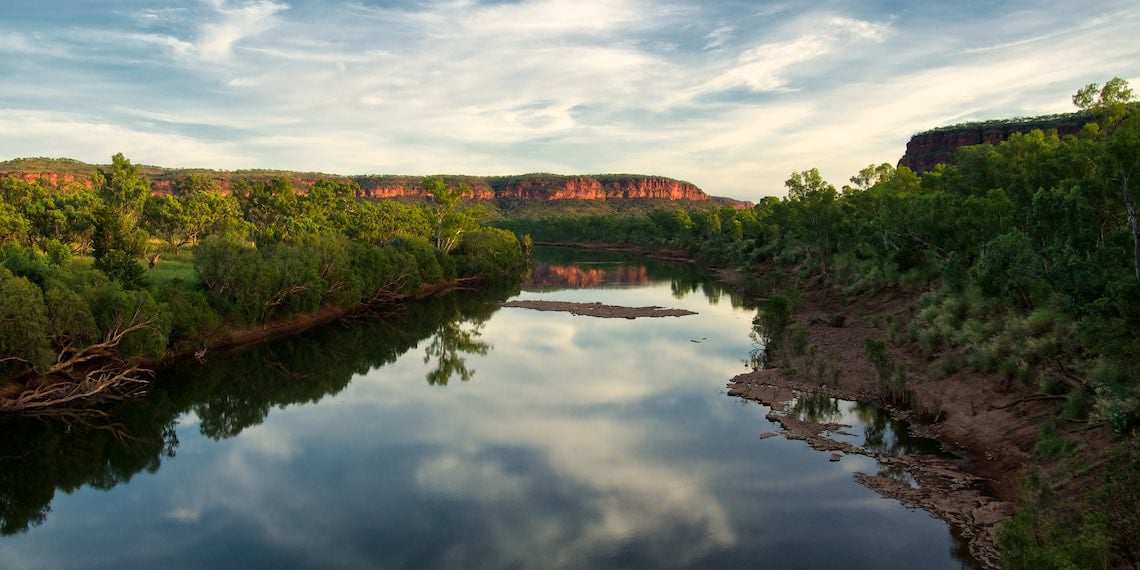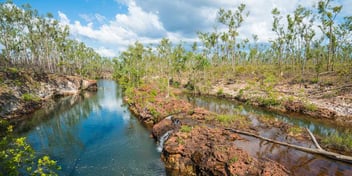NWI renewal provides opportunity to improve Aboriginal outcomes

As Australia edges closer to national water reform under the new federal government, the Northern Land Council is calling for a renewed and determined focus on effectively addressing water issues impacting Aboriginal communities across the Northern Territory.
In line with recommendations from the Productivity Commission’s 2020 National Water Initiative (NWI) inquiry report, the federal government is planning to establish a new National Water Commission, with one of its key functions being to support the renewal of the NWI.
Addressing delegates at the AWA/WSAA Voices for the Bush conference held in Alice Springs earlier this month, Northern Land Council (NLC) Environmental Policy Officer Bridie Velik-Lord said NWI renewal should be used as a vehicle to improve outcomes for Aboriginal peoples.
“There are about 51,000 Aboriginal people who live in the NLC area and the large majority of our constituents reside in regional and remote water locations,” she said.
“Everything relies on water, from drinking and bathing to the protection of cultural and sacred sites, from medical treatment to economic development. And there is much that needs to be done to improve outcomes for Aboriginal people in relation to water in the NT.
“As we embark on a new era of water management at a federal level, it is timely to explore how we as an industry can use the NWI as a mechanism to ensure outcomes for Aboriginal people across the NT are improved today.
“There remains a great deal of work to do under the NWI. But influencing change will take courage from the water industry, and I hope that, collectively, we are up for that challenge.”
NT water woes
Velik-Lord said the Productivity Commission inquiry found that the NT was non-compliant against a number of NWI components, including a decline in the ability of community and stakeholders to be involved in water management decisions.
“The Productivity Commission found that the majority of water-taking in the NT is not underpinned by statutory-based water plans,” she said.
“In reality, the NWI specifies that the allocation of water to a water access entitlement or water extraction license must be made consistent with a water plan, and effective water planning by its definition must include a transparent process for determining how the volume of water in a water system is shared between consumptive and non-consumptive users.”
With 68% of the NLC region outside of water control districts, water taken from many NLC areas is largely unregulated, Velik-Lord said, hindering the ability for Aboriginal communities to be part of deliberations regarding water use.
“Water-take in a lot of the NLC region doesn't require licensing at all. But one of the critical roles of water planning is to set trade-offs between competing outcomes for water systems,” she said.
“As the Productivity Commission report highlights, water planning is an important mechanism used to assist governments and the community to determine water management and allocation decisions required to meet productive environmental and social outcomes.
“When we think about the ability of Aboriginal people to be part of trade off deliberations regarding water use, which affects their rights and interests — their Country and their communities — it is only through the community input component of water planning that they have any voice.”
Furthermore, Velik-Lord said most communities are supplied with water that does not meet the health or aesthetic parameters defined under the Australian Drinking Water Guidelines.
“In total, over 70% of remote and regional communities in the NLC region are supplied with potable water that does not meet guideline parameters. This equates to over 23,000 people in remote communities,” she said.
“While the majority of these communities do not meet the aesthetic parameters, there are four communities where the water supply does not meet health guideline parameters.
“Every day almost 45% of our constituents face a question when they turn on the tap: is the water coming out safe for me and my family?
“There are challenges, of course: remoteness, dispersed population centres, harsh climatic conditions, and an absolute lack of alternative water resources. I don't want to understate those challenges, but we must do better.
“A renewed NWI should include a commitment by state and territory governments to develop definitions of and ensure access to a basic level of water service for all Australians.”
Including Indigenous voices
In order to address these issues, the NLC submission to the Productivity Commission recommended that individual communities be actively involved in determining their required level of service and requirements for water service provision.
“It is critical that Aboriginal people determine the level of service that is acceptable to them. Aboriginal Territorians continue to make it abundantly clear that they want and deserve to be part of the conversation. They must be part of the solution to water management in the NT,” Velik-Lord said.
Velik-Lord said there are four key focus areas that need to be included in reform, starting with allowing Aboriginal people’s voice to lead the direction of water service provision in their communities.
“We must move away from informing or consulting people. We must ensure that the right people are at the right place at the right time to be part of the decision-making process. This is not an optional participation exercise for the water industry. It is an absolutely critical component,” she said.
“Indigenous people both govern and manage their Country. A renewed NWI must ensure that governments respect and enable Indigenous people's governance arrangement and promote self-determination. This is our collective responsibility.”
Velik-Lord said water resource management decisions that are made within a thorough and transparent consultative process must become the norm.
“The Productivity Commission has recommended the co-design of a new NWI element dedicated to Aboriginal and Torres Strait Islander people's interest in water and involvement in water management,” she said.
“This is certainly welcomed, but as a word of caution: a renewed NWI element is never going to succeed unless we recognise the need for a fundamental flip in the way that water is currently managed in the NT. We need to address this as a matter of urgency.
“Communities must also play a central role in determining acceptable levels of service for potable water supplies. This must be done as part of meaningful partnership approaches with service providers.”
Lastly, Velik-Lord said that Commonwealth funding principles must adhere to a new era of water reform, one which recognises Aboriginal and Torres Strait Islander people's cultural responsibilities and desires to participate in water management.
“We all have a part to play. And the Commonwealth’s part is critical. One aspect of this is to ensure that its investment in the NT is sound and that federal money flows only when the Commonwealth is satisfied that the NT is doing right by Aboriginal people,” she said.
“Those Aboriginal people who are meant to see the benefits of a renewed NWI must have a clear line of communication to talk directly with those funding agencies. They must be able to voice their opinions about where the progress is being made. And the Commonwealth must respond accordingly.”


